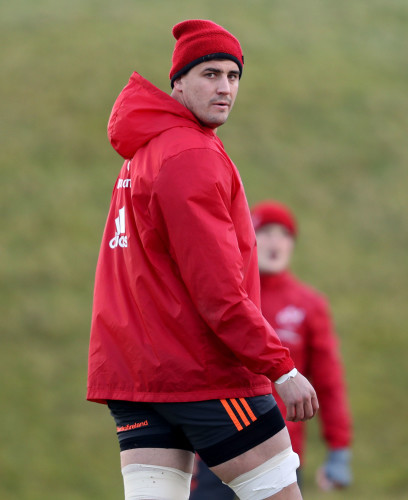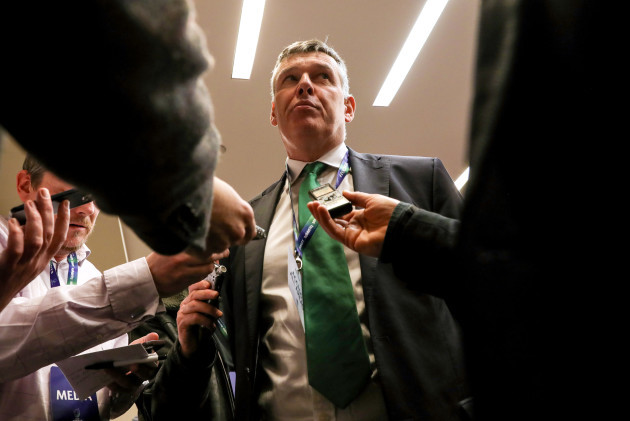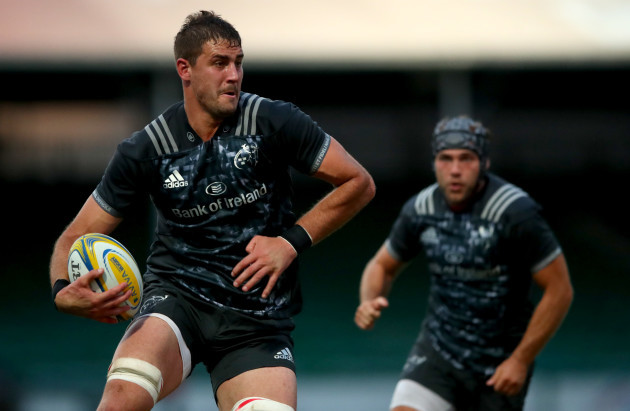ONE WONDERS HOW Gerbrandt Grobler has been feeling over the last week and a half as the controversy around Munster signing him has kicked off and picked up speed.
Six months into his one-year stint in Ireland, the South African probably hoped he had skipped beyond having to deal with this kind of storm, but the debate has been raging as the wider public and media have become aware of his past.
If anything, the heat Grobler must be feeling serves as an example to other players who might have or might be considering doping as a means to progressing their career – you are likely to be tarred by it if you’re caught.
Many people will struggle to feel even a hint of sympathy for Grobler but this must be a difficult time in his life. He did the crime and, though Munster have pointed out that he did the time with his two-year ban, he continues to pay the price.
While it has been debated whether Grobler deserves to be at the centre of this storm, it is a positive for Irish rugby that we are talking about the issue of doping. We simply don’t do it enough.
Only the most innocent of us believe that rugby is clean, but this debate is raised so rarely in our sport – aside from the usual voices, who have often been unfairly ridiculed for fighting this particular fight.
The majority of us who look at rugby and other sports are not stupid; we have our suspicions, even if it is sometimes from an inexpert point of view and to express those suspicions without proof is libellous.
Now, we have been given an opportunity for Irish rugby to talk about the circumstances around a player who has decided to cheat, has been caught and has served a ban before being brought into our system.
Does the player deserve a second chance? Should Irish rugby be providing that second chance for any player? What is our policy on convicted dopers? These questions are all now part of an open debate, and that is welcome.
One intriguing aspect of this whole episode is asking whether fans even care. The supporters are the ones who shell out their hard-earned money to follow the professional sport, to buy tickets and jerseys, to fly around Europe backing their team.
A fascinating column by Sean Ingle in the Guardian this week discussed academic evidence from cycling, baseball and other sports that suggests that although people say they abhor doping, they continue to support even after athletes have been caught cheating.
We all say we want a drug-free sport, but it seems we don’t back that up when it comes down it. For some, doping is absolutely wrong until it directly affects their team.
Of course, the Grobler case is different in that he has already served a ban and previously returned to play with Racing 92, but even still it appears that some of us simply accept doping as part of the deal in professional sport.
It has also been interesting to note the criticism the media have faced for pursuing this story, with that criticism being particularly aggressive from some quarters.
Perhaps this debate should have happened back in July when Grobler’s signing was announced by Munster, or when he took to the pitch for the province in pre-season before injury, but to focus so repeatedly on the timing is to avoid the real conversation.
What has been evident in the last 11 days is that many people were not aware of Grobler’s past, with high-profile ex-players and pundits among those admitting to a lack of knowledge.
Yes, the hardcore Munster fans were obviously up to speed on Grobler’s arrival and probably debated its merits passionately.
But the hardcore fans aren’t the only ones who need to consider this. They are the foundation of the support base, of course, but there are thousands of casual fans who swell the numbers at provincial and international games or pay to watch rugby on TV.
Those casual supporters need to be part of this debate and it’s very clear that the Grobler controversy is completely new to them and has brought doping in rugby back into their consciousness.
The media also have a duty to ask questions, whether one thinks it’s timely or not. If the rugby media in Ireland is happy to simply toe the IRFU and provinces’ line, regurgitating press releases and asking the easy questions, then they are failing in one of their duties.
Yes, the Grobler storm has probably led to increased numbers of paper sales or website clicks, but if we ever get to the point where the rugby media is totally compliant and unwilling to rock the boat, it will be a sad day.
The Irish Independent’s Rúaidhrí O’Connor deserves credit for raising the issue with Johann van Graan at Munster’s press conference last week and kick-starting this debate.
As a result of the media pressure, the IRFU have now shown their willingness to actively consider their policy on the recruitment of players with a history of doping. That is a huge positive in all of this, whatever their conclusion.
Many will angrily argue that the IRFU should never sanction the signing of another player with Grobler’s past, others will vehemently defend their sense that the player has served his ban and is entitled to his ‘second chance.’
Some believe that players who have admitted to knowingly taking banned substances should be banned for longer than two years, while others feel that two full seasons out of work is sufficient.
Let’s debate that point vigorously again, perhaps the key point in all of this, and hope that the relevant rugby authorities do too.
One thing that seems sensible for us all to agree on, and act on, is that doping in sport is very wrong. So to be talking about it openly like this in Irish rugby for the first time in years is welcome.
The42 has just published its first book, Behind The Lines, a collection of some of the year’s best sports stories. Pick up your copy in Eason’s, or order it here today (€10):



